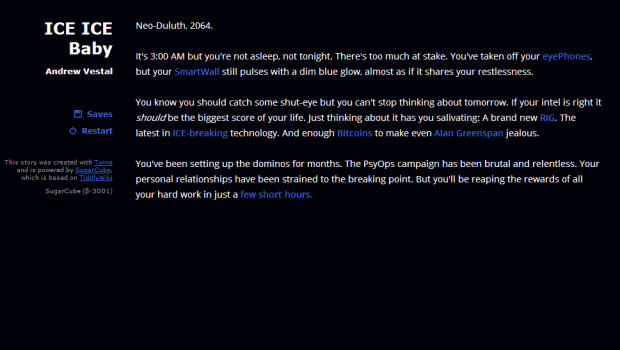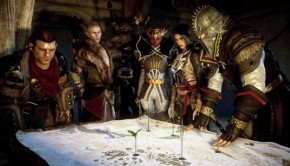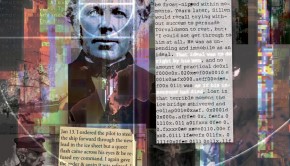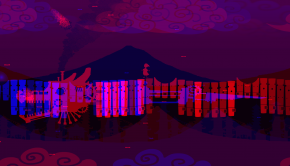ICE ICE Baby: Appetite for Destruction
Note: Spoilers follow in this article; please go ahead and play the game in question before reading. Go on, it’s short!
“Why is it that the self—though it professes to be loving, caring, to prefer peace to war, concord to discord, life to death; to wish other selves well, not ill—in fact secretly relishes wars and rumors of war, news of plane crashes, assassinations, mass murders, obituaries, to say nothing of local news about acquaintances dropping dead in the street, gossip about neighbors getting in fights or being detected in sexual scandals, embezzlements, and other disgraces?” -Walker Percy, Lost in the Cosmos
Dystopia is a central component of cyberpunk. The genre revolves around a rejection of the old optimistic futurism, which held that advanced technology would usher in paradise on Earth. Cyberpunk is more critical, suggesting that any societal issues technology solves will only be replaced with different problems. We can fit the Library of Congress onto a chip a couple inches wide and a millimeter thick, but access to that information will still only be in the hands of the privileged. We can network the whole world, bringing humanity closer together than ever before in history, but what we’ll find is that we mostly can’t stand each other. “A new day is coming,” says cyberpunk, “but don’t get excited.”
Unless.
Unless dystopia excites you. Unless you crave the idea of society gone off the rails. Unless ordinary life seems so dull and tedious and pointless that you can only stand it by dreaming of a crisis. This is the starting point of ICE ICE Baby, Andrew Vestal’s entry in the Cyberpunk Game Jam 2014.
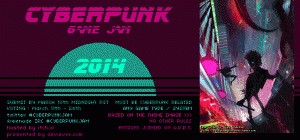 The game starts by invoking every cliche and genre trope it can in the initial screens. The first few links contain supplemental worldbuilding information about “Neo-Duluth, 2064” that hit familiar checkboxes like rampant AIs, genetic modification gone haywire, Eastern mysticism, and sleek, lightweight hacking rigs meant to do battle with malevolent ICE. Vestal knows that this stuff is sexy despite itself; cyberpunk wouldn’t be the popular genre it is now if it wasn’t attractive to so many of us on a surface level. Who among us Internet junkies wouldn’t want to live in a world where the ‘net “skills” we already have directly translate into being countercultural heroes?
The game starts by invoking every cliche and genre trope it can in the initial screens. The first few links contain supplemental worldbuilding information about “Neo-Duluth, 2064” that hit familiar checkboxes like rampant AIs, genetic modification gone haywire, Eastern mysticism, and sleek, lightweight hacking rigs meant to do battle with malevolent ICE. Vestal knows that this stuff is sexy despite itself; cyberpunk wouldn’t be the popular genre it is now if it wasn’t attractive to so many of us on a surface level. Who among us Internet junkies wouldn’t want to live in a world where the ‘net “skills” we already have directly translate into being countercultural heroes?
But it’s not long before Vestal punctures the fantasy by revealing it to be literally childish, pulling back the curtain just enough to hint that we’re in the head of a current-day preteen in Pre-Neo-Duluth, bored by his surroundings and wishing that his world was a lot more dangerous, cutthroat, and generally broken than it actually is. The reason for his malaise isn’t given, but then, his sulky adolescence is familiar enough that expecting it to have an cause is almost beside the point.
What’s our reason, though? What’s our excuse? Why are we so desperate for meaning that when no crises exist in our lives, we invent them? For most of us, the crisis fantasy is benign: we play video games to pass the time because there, we can be heroes who face and overcome evil. Even if the evil isn’t real and (by extension) neither is the heroism, it feels good enough to fill the hole for a while.
But the same lust for dystopia informs a much darker side of humanity, often with more tragic consequences. As Christian blogger Fred Clark has pointed out time and again, this kind of fantasy role-playing is at the core of some of the most regressive and pernicious movements in the U.S. today. “Let’s pretend that our unremarkable lives of quiet desperation are actually epic quests in the service of something meaningful,” writes Clark, “Let’s pretend our lives are driven by some purpose. Let’s pretend we are engaged in the great moral struggle of our time—that we are opposing some massive and twisted evil. Let’s pretend that this struggle requires courage and commitment and let’s pretend that we possess those things. Let’s pretend that we are all that stands between this country and brutal chaos—that we and we alone are the ones keeping it all together.”
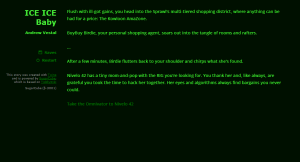 And in the end, the fantasy can’t maintain cohesion—not in the real world and not for Vestal’s nameless brat. Though much of ICE ICE Baby’s action is clearly allegorical (such as the rundown of “hacking supplies” revealed one by one to be mundane snacks), the game ends in an encounter with a figure who defies allegory. It doesn’t seem to be the boy’s father, and Santa Claus himself stretches credibility for the story’s conceit, but if not them, who?
And in the end, the fantasy can’t maintain cohesion—not in the real world and not for Vestal’s nameless brat. Though much of ICE ICE Baby’s action is clearly allegorical (such as the rundown of “hacking supplies” revealed one by one to be mundane snacks), the game ends in an encounter with a figure who defies allegory. It doesn’t seem to be the boy’s father, and Santa Claus himself stretches credibility for the story’s conceit, but if not them, who?
Whoever it is, his key line is, “You’ve got potential. No—you’ve got talent. And it’s wasted here.” The cyberpunk dystopia may be an alluring crisis, but there are better, more real problems we could be devoting our talent to. The mysterious figure gives the boy a card asking that you stay in touch, which transforms into a timer ticking down to a year from now, when the boy will be “practically an adult.” A time when he may perhaps be ready to put his childish fantasies of dystopia behind him.
While ICE ICE Baby may be thin, and easily experienced start to finish in under 10 minutes, it gestures towards some weighty ideas. In just a few days of work, and in his first offering, Vestal has managed to make a cyberpunk video game sharply critical of both cyberpunk and video games. Not a bad start.

